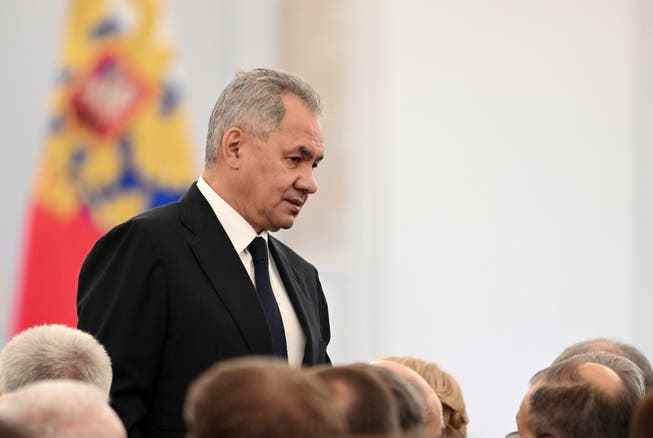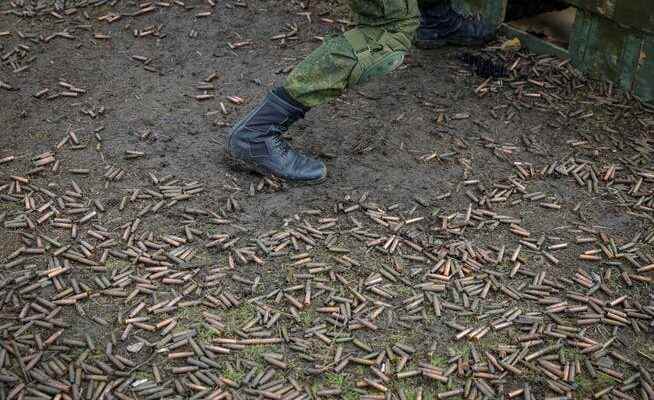Anger at the army leadership is growing in Russia because of the defeats in Ukraine and the shortcomings in mobilization. Actors who are dangerous for the Kremlin also take advantage of this.
A reservist drafted in the course of mobilization practices shooting.
Is this what the beginnings of a soldiers’ uprising look like? Men in ill-fitting military uniforms stand by the railroad tracks, smoking, brandishing guns and complaining loudly. They were called up during mobilization and unloaded here, in the Belgorod region bordering Ukraine. No one takes care of them, they have to get their own food, and for the past few days they have slept in shelters they built themselves. They would be treated like cattle. The weapons they carry were not even registered to them. They accidentally found ammunition themselves. If nothing changes in the situation, they will go on strike.
fear of the uprising
Equal multiple videos have caused a stir on social networks in the past few days, which apparently show the same scene from different perspectives and with different “heroes”. The message is clear: Look, this is how the completely overwhelmed Department of Defense is dealing with conscripts. The threat of a strike by armed forces awakens a primal fear in Russia – the fear of the “bunt”, the uprising.
Attentive researchers but quickly noticed a few inconsistencies. Her suspicions were not only aroused by the fact that there were several videos with almost identical messages from different voices. A man who had already complained in a video two weeks ago about how the called-up reservists were treated was identified as the author of one of the videos. Finally, it is also striking that members of the Wagner group, the private army of the dodgy businessman Yevgeny Prigozhin, can be seen among the dissatisfied. There are suspicions that Prigozhin’s forces may have deliberately fueled the displeasure – in order to increase the pressure on the military leadership and Defense Minister Sergei Shoigu.
Shoigu has been criticized practically since the beginning of the “special military operation”, the Russian attack on Ukraine. In March there were even rumors that he had fallen out of favor. Since defeat followed defeat along the front in eastern and south-eastern Ukraine and even the mobilization revealed blatant weaknesses in the army, more and more voices have been raised against Shoigu and his generals. Among these critics are some of the most ardent advocates of imperialist war policy.

Defense Minister Sergei Shoigu during the ceremony on the “union” of Donbass and Southeastern Ukraine in the Kremlin.
Private Army and Media Power
The fact that two particularly influential voices, who were particularly influential in their own way, made sharp, even humiliating criticism at the same time, caused a sensation last weekend: Prigozhin and the Chechen ruler Ramzan Kadyrov. Both have paramilitary units that are loyal to them, largely exempt from the state’s monopoly on the use of force, and have their own media presence – a highly explosive combination.
If the videos of the allegedly dissatisfied soldiers were actually orchestrated by Prigozhin’s people, it shows how great the influence of this dazzling businessman with apparently the best connections to the Kremlin is. Not only did he recently come out as the founder of the Wagner group; he also owns a media empire that he can put at the service of the state or use against it, depending on his mood. Kadyrov’s tirades are more candid; he expresses himself directly in his channels on social networks, where he has an audience of millions.
Although his latest outburst was more bluntly worded and aimed more squarely at an army general and his patron than ever before, he does not appear to have lost favor with the Kremlin. For his birthday on October 5, Putin bestowed on him the title of Colonel General of the National Guard. However, an elite police unit recently ruthlessly arrested the administrator of several Telegram channels, which are attributed to Prigozhin and had slandered high-ranking officials like Shoigu. This was seen here and there as an expression of a power struggle.
Propagandists join in
Kadyrov and Prigozhin are perhaps the most dangerous voices for the Kremlin, but they are not the loudest, calling for increasingly urgent consequences for the military leadership. The military correspondents and bloggers who had become influential as a result of the war had seen some of the abuses coming for a long time and, like the generals, had called for mobilization at an early stage. The soldiers and officers at the front also speak from their now frustrated and disappointed-sounding reports. They paint a bleak picture of the military situation.
This, in turn, is picked up by the propagandists’ talk shows. Vladimir Solovyov, for example, is calling for ever more drastic measures against fallible responsible persons, asks questions about logistics, armament and strategy. In his view, Russia no longer fights against Ukrainians at all, but only against Western mercenaries with NATO weapons. Duma deputy and former deputy minister of defense Andrei Kartapolov demanded by the General Staff in one of the broadcasts full honesty in informing the population about the military situation. Lying to people undermines the state’s credibility. The editor-in-chief of the state broadcaster RT, Margarita Simonyan, also called on people to stop lying.
These propagandists justify their actions with the fact that Russia absolutely has to win the war. The more obvious it is that something is going wrong, the more uncomfortable it becomes for Shoigu and the generals. Putin, the actual originator of the disaster, is completely exempt from criticism. Dealing with the anger of those who are actually loyal to them is far more difficult for the Kremlin and the Defense Ministry than dealing with those opposed to the war.
Kadyrov, Prigozhin and Solovyov cannot simply be dismissed as traitors and foreign-paid provocateurs. Sooner or later, however, they too could be put in their place if they are seen as a threat to the regime. The unrest that failures have provoked among the elites and popular resentment at mobilization call for answers before mutiny occurs.
